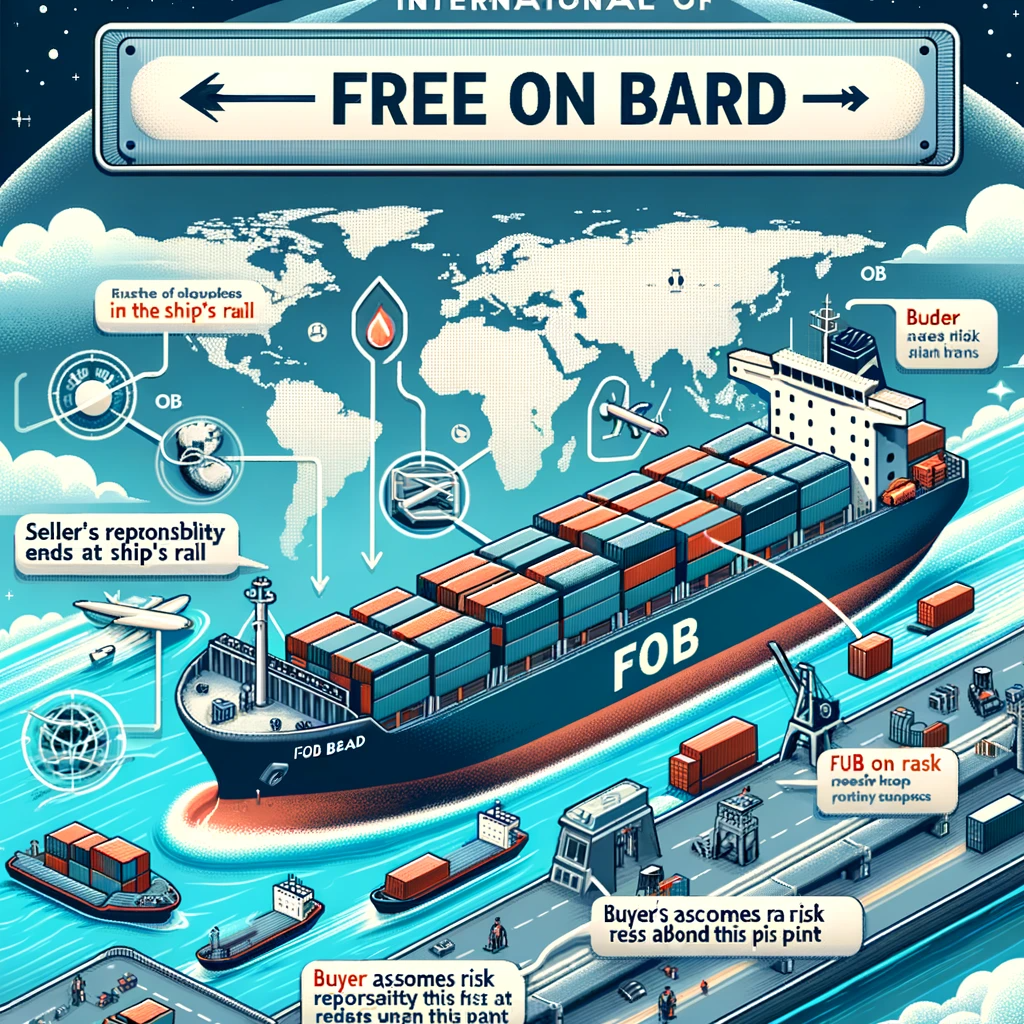FOB Meaning
FOB, an acronym for “Free On Board,” is a term used in international trade to indicate when the liability and ownership of goods transfer from a seller to a buyer. It specifies the point in the transaction where this occurs, which is crucial for determining costs and responsibilities associated with shipping.
Understanding FOB is essential for businesses engaged in global trade as it helps delineate the cost responsibilities between the buyer and the seller. It impacts how freight charges are handled and at what point the risk shifts from the seller to the buyer. This clarity is vital for financial planning and risk management in international logistics.
Comprehensive International Shipping Cost Estimator
What is FOB?
FOB (Free On Board) is an international trade term where the seller is responsible for the goods until they are loaded onto the shipping vessel at the port of origin. The FOB price typically includes the cost of goods, transportation to the port, loading costs, export duties, and clearance charges.
Simple Explanation:
FOB is a shipping term that tells you who is responsible for the goods during shipment. When a sale is made with FOB terms:
- The seller is responsible for the goods until they are loaded onto the ship at the specified port.
- Once the goods are on the ship, the buyer becomes responsible for them.
Example:
If a product is sold as "FOB Shanghai," it means:
- The seller pays for transportation of the goods to the port of Shanghai and the loading cost.
- The buyer pays for shipping from Shanghai, insurance, unloading, and transportation from the arrival port to the final destination.
Key Points about FOB:
- It determines who pays for which shipping costs.
- It establishes when the risk transfers from seller to buyer.
- It's always used with a named port of shipment (e.g., "FOB New York").
- It's commonly used in sea and inland waterway transport.
Why is FOB Important?
FOB is important because it clearly defines:
- Who is responsible for the goods at each stage of shipping
- Who pays for each part of the shipping process
- When the ownership of the goods officially changes hands
This clarity helps prevent disputes and ensures that both buyers and sellers understand their responsibilities and costs in international trade transactions.

Find the Best Incoterm for Your Shipment
Benefits and Risks in FOB Shipping
For Buyers: FOB terms provide clarity on when they assume responsibility for the goods. This understanding is crucial for risk management and insurance purposes. However, buyers must be aware of the additional responsibilities and potential risks from the point of shipment.
For Sellers: FOB terms clarify when their responsibility for the goods ends, reducing risks associated with transportation. However, sellers need to be aware of the obligations until the point of transfer, including ensuring proper packaging and loading.
In conclusion, the evolving international trade landscape in 2023-2024, with its new regulations and customs procedures, presents both opportunities and challenges for global businesses. Understanding and adapting to these changes, particularly in terms of FOB terms and compliance requirements, is essential for successful international trade.



Key Developments in 2023-2024
UK’s Border Target Operating Model: In 2024, the UK will introduce the final Border Target Operating Model, affecting imports of medium risk animal products, plants, and certain food items from the EU. This model requires businesses to assess the risk levels of their commodities and adapt to changes in border processes.
EU’s Import Control System 2: The third update of the EU’s customs pre-arrival safety and security system, Import Control System 2 (ICS2), will be released in March 2024. It mandates new requirements for all goods transported to or through the EU, necessitating businesses to adapt their systems and ensure compliance.
Northern Ireland Retail Movement Scheme: This scheme introduces new labeling requirements for certain food products, with different phases being implemented in 2023 and 2024. The labels must indicate ‘Not for EU’ for products moving under this scheme.
EU-Japan Economic Partnership Agreement: This agreement, enhanced in 2023, now includes rules for cross-border data flow, facilitating online business and digital trade. It eases data handling requirements for companies, reducing costs and security risks.
Adjustments in U.S. Customs Fees: The U.S. Customs and Border Protection (CBP) has adjusted its customs user fees for FY 2024, effective from October 2023. These adjustments affect the costs associated with customs processes and compliance for businesses.
Global Corporate Tax in the EU: A minimum tax rate of 15% for multinational corporations has been introduced in the EU, aimed at countering tax havens and reforming corporate taxation. This change affects the tax obligations of multinational companies operating in the EU.
Practical Applications of FOB
FOB terms, a crucial component of international trade agreements, define the point at which the responsibility and risk transfer from the seller to the buyer. In 2023, it remains essential for both parties to clearly understand and agree on FOB terms, as they dictate who bears the transportation costs and risks during shipping. FOB is especially relevant in sea or inland waterway transport.
Benefits and Risks
For Buyers: FOB terms provide clarity on when they assume responsibility for the goods. This understanding is crucial for risk management and insurance purposes. However, buyers must be aware of the additional responsibilities and potential risks from the point of shipment.
For Sellers: FOB terms clarify when their responsibility for the goods ends, reducing risks associated with transportation. However, sellers need to be aware of the obligations until the point of transfer, including ensuring proper packaging and loading.
In conclusion, the evolving international trade landscape in 2023-2024, with its new regulations and customs procedures, presents both opportunities and challenges for global businesses. Understanding and adapting to these changes, particularly in terms of FOB terms and compliance requirements, is essential for successful international trade.
FOB Meaning and a Brief History
As defined in incoterm, the term FOB stands for Free on Board/Freight on Board has its origin traced back to the days when goods shipped by sail ships were passed over the rail by hand. In that case, it was the term used to generally refer to the goods shipped by sea since it was the major transportation method for shipping cargo from abroad.
However, the usage of this term has changed quite a big deal. And actually, it varies in different countries and jurisdictions. The term ‘pass over the rails’ was then dropped from the definitions available in the incoterm in the amendment passed in the year 2010.
When it comes to North America, the term FOB is written in the sales agreement in order to determine the liability as well as the responsibility of the goods as they are transferred from the seller to the buyer.
FOB – Free On Board Shipping
Times have really changed over the past few years. Today the supply chains stretch as far as the global levels. And in that case, it has become almost inevitable for the supply chains to exist in a country without purchasing or selling products and the raw materials from foreign countries.
With that in mind, you need to know that in the course of any international trades. There must be compliance with the existent cultural differences as well as any international laws that govern trade. However, this could always lead to confusions here and there, when there is a need to interpret the obligations and contractual terms of trade.
One of the most commonly confused terms is the ‘Free on Board’ which seems like quite an ironical name to me. This is because the service is not free at all and the failure to understand that could possibly lead to problems when shipping products from foreign countries.
Such issues could occur in a situation where the party responsible doesn’t take responsibility for damages or the occurrence of any other event. For that reason, it’s necessary that shippers and receivers understand the term free on board. As well as the impact it has on the obligations and responsibilities when shipping goods from abroad. Shall we get started?
What Does FOB Stand For and FOB Shipping?
FOB shipping stands for free on board which in some cases is referred to as Freight on board. Well, this is a set of Incoterms that tend to govern the party that owns as well as pays for shipments to overseas. In that case, FOB stand for a designation that is used to indicate when the ownership and liability of goods are transferred from the seller to the buyer.
In some cases, is used with an identified physical location. Therefore, the designation in such a case determines the responsible party for the freight charges payment. More to that, it indicates the point at which the title for that particular shipment changes ownership and liability from the seller to the buyer.
In the past years, it was only used for the seafaring category of shipments. However, currently, it can be used for just about any mode of transit shipments. Also, it is important to note that although the word free is used in the FOB shipping, it actually doesn’t negate the shipping cost for the goods in transit. The word is simply used to refer to whoever has the liability and obligation to take care of the shipment in transit. The shipping cost is determine by the cubic feet (CBM), volume, distance, weight and other factors.
What is the FOB Shipping Point?
The FOB shipping point is a term that is used in international trade. It tends to specify where the ownership of the goods is transferred from the seller to the buyer. In this case, the FOB shipping point indicates that the liability of the goods is transferred from the selling party to the buyer as soon as the cargo is placed on the delivery vehicle.
Since in the FOB shipping point the ownership and liability of the goods are transferred to the buyer, the legal title of the goods is all transferred to the buyer too. And in that case, the seller is not at any one point responsible for those goods throughout the delivery process.
The seller’s responsibility in such a case is only bringing the goods to the carrier or freight forwarder. Therefore, if anything happens to the goods during the delivery process, the buyer is fully liable and are expected to assume all responsibility.
FOB Origin vs. FOB Destination
These two terms can be a little confusing at times. However, we will give you a more detailed explanation of both.
FOB Origin
Well, when an order is labeled as FOB Origin it simply means that any transfer of responsibility or ownership happens only when the goods leave the hands of the seller.
In that case, if the goods need to be shipped to the buyer. It’s the buyer who will pay for the freight charges. In some cases, FOB origin could be referred to with city names. For instance FOB London.
FOB Destination
On the other hand, FOB Destination means that the receiver/ buyer takes responsibility and ownership of the goods until they are delivered to the doorstep of the buyer. In this case, the seller tends to be responsible for freight charges of the goods to the buyer. More to that, the seller is also liable for any damages of the goods when they are in transit to the buyer. However, the seller may charge the buyer for these transportation costs.
The ‘Free on Board’ Shipping Terms
When it comes to free on board shipping terms, there are few add-on words. This might be included in the bill of landing, freight invoice or any other forms of documentation used for the shipping process. Such terms include;
Shipping Terms FOB
1-FOB Origin, Freight prepaid:
- The shipper is liable for the shipping cost. While the buyer is responsible for the goods from the point of origin.
2-FOB Origin, Freight Collect:
- The buyer pays for the shipping and freight costs as well as assumes full responsibility for the goods.
3-FOB Origin, Freight prepaid and charged back:
- this means that the seller doesn’t pay for the shipping cost. But instead the seller adds the freight costs on to invoice they send to the buyer. In such a case, the buyer has to pay the bill on a more expensive invoice as the freight costs are included on the invoice. More to that, the buyer assumes full responsibility and ownership of the goods right from the point of origin.
4-FOB Destination, Freight Prepaid:
- this means that the seller pays for all the costs incurred on the shipping until the goods are received by the buyer at their store. In this case, the buyer doesn’t pay for any shipping costs.
5-FOB Destination, Freight Collect:
- this means that the buyer pays for all the shipping and freight costs as soon as the goods are delivered. In this case, the buyer takes ownership and responsibility for their goods until the goods are delivered to their premises.
6-FOB Destination, Freight Prepaid and Charged back:
- this means that the seller takes responsibility for the shipment until the goods are delivered. In this case, the buyer deducts the shipping charges from the invoice. This is because the invoice originally sent to the buyer includes also the freight charges. The deduction is not made until the seller pays for the freight charges.
7-FOB Destination, Freight Collect and allowed:
- this means that the seller adds the costs of the freight to the invoice. In this case, the buyer pays for the shipping charges and the seller takes on the responsibility for the goods until the delivery process is successfully done.
How FOB is used in Shipping Documents?
When it comes to freight shipping, the term could be used in four diverse ways. For instance: FOB Origin, Freight Collect. The first section of the designation determines the location at which the buyer will assume the ownership and responsibility for the goods.
The second section, on the other hand, indicates the responsibility attached to the freight charges. Collect in this case means that the buyer will be responsible for the shipping cost payment. While prepaid means that the seller will pay for the freight charges.
It is always important that buyers understand the Freight on Board designations just in case there are damages that occur. This is because some of the receiving docks may reject delivery of any goods that are damaged instead of just accepting them with a damage notation for the carrier in case of any future claims. Sometimes things could get too complicated when handling shipments.
FOB Accounting Relevance
When it comes to FOB shipping. The shipping costs of the shipment are determined as soon as the buyer takes up the ownership as well as the responsibility of the goods being shipped. And this also impacts the accounting system of that particular company. Therefore, if goods are sent to a FOB shipping point, the sales process gets concluded as soon as the carriers exit the sellers loading dock. This is particularly recorded in the accounting system this way.
However, on the buyer’s side, they need to note down in the accounting system that the shipment comes along with an inventory. And that inventory now happens to be an asset for the buyer. No matter whether the shipment has already arrived at the final destination or not.
Advantages of FOB for the Seller and Buyer
The Incoterms
Well, if this doesn’t sound familiar to you. These are the standard guidelines that majorly govern any forms of international trade. In that case, when it comes to shipping that needs to be done internationally. Free on board or freight on board, is the most commonly used agreement.
This is because it determines the responsibility for both the seller and the buyer. More to that, the it defines the point at which ownership and liability get passed on from one party to the other.
It Includes the Customs Clearance
In FOB shipping, the sellers/ suppliers are the ones who are responsible for making clearance for the goods at the export docks. This includes the export clearance documents at the terminal or at the port. This indeed saves the buyer a considerable amount of complications and unnecessary hassle. In this case, it helps to save up both money and time for the buyer.
Effective Shipping Costs Terms
Well, FOB is one of the most commonly used terms for international trade. And I bet, that’s for a reason. This is because this method offers some of the most effective terms for shipping costs. For that reason, it happens to be convenient for most shippers as well as receivers.
The Disadvantages of FOB for Buyer and Seller
FOB is, without doubt, one of the most effective shipment methods for international trades. However, it has a few shortcomings which may majorly affect the buyer. In that, if the buyer gets their goods using Free on Board terms, they are likely to take on the risks. Therefore the costs that are incurred during the shipping process as soon as it is loaded on the carrier for transit. In that case, any loss, damages or even additional costs from then onwards will be the buyer’s responsibility.
In Summary…
One thing I can say is that FOB is a great way for international trade. Since you always have the chance to choose which side of the trade you lie. The best thing about it is that you always have the chance to have full control of your shipping costs and liability of your goods.
Therefore, as you imagine how great it is to export goods and you may not have to pay for the freight charges beyond the port. Just know that this may reduce risks but totally denies you control. In that case, just know what method to use as an international trader.
One time you can be the importer and the next you are the exporter. Just remember to choose what will work in your favor. Also a good place to get better rates is using free load boards


